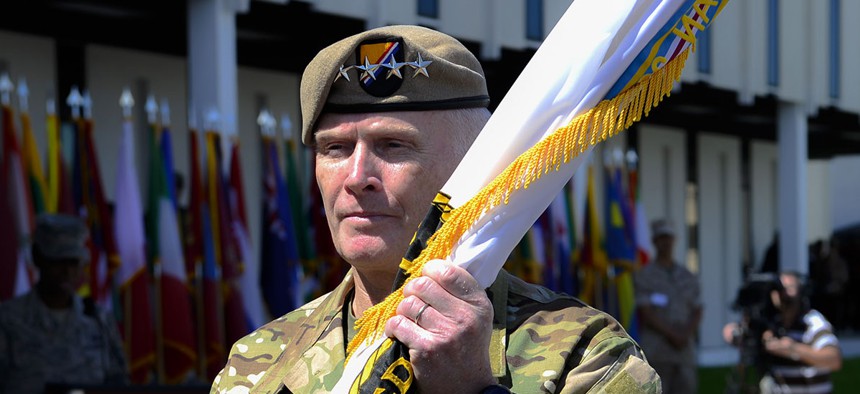
Michael Bottoms/Defense Department
The New Special Operations Commander Wants to Predict the Future
With so many elite troops fighting ‘an extremist phenomenon that’s gone rabid’ in failed states, Gen. Tony Thomas wants to get his operators ahead of the curve.
Tampa, Fla. — Getting “left of bang” in a ready position to deal with new threats in their early stages is the most important challenge for the future of U.S. special operations forces, according to their new commander, Gen. Raymond “Tony” Thomas.
The little-known Army Ranger, new to the 4-star spotlight atop U.S. Special Operations Command, sees America’s elite troops transforming from a reactive to a proactive force, one that operates globally, but still with a light footprint. Thomas’s vision is a force that is predictively employed, rather than reactively deployed. “It is in the area of left of bang where we must strive to be more relevant in the future,” he said.
Thomas has been working counterterrorism operations for most of his career. He led the first Ranger contingent into Afghanistan after the September 11 attacks and in 2008 reportedly survived a bomb attack on his vehicle while conducting operations in Mosul, Iraq.
Today, the 1980 West Point graduate is looking to expand SOF’s global presence with more forward access into more countries, operating more continuously with partner governments and militaries.
“Left of bang is less a technological approach than a people-access approach: being there ahead of time, having relationships there ahead of time, identifying problems before they become crises, developing that partner capacity, prior, not after, a response. We are too often on the other side of that,” Thomas said Tuesday, at the National Defense Industrial Association’s Special Operations Forces Industry Conference, or SOFIC, in Tampa.
The future of SOCOM is a command transformed, almost, into a quasi-intelligence agency. “We are very, very kinetic right now; very direct action because we are trying to rectify five failed states and an extremist phenomenon that’s gone rabid. Once we get that back in the box, eventually, I hope, we can have the right sort of access, placement, connective tissue, to retain stability.”
He acknowledged that getting into a more predictive stance would mean special operators spending more time deployed to places where there is no ‘hot fight’ but where tensions might be brewing or circumstances developing to nurture new threats. A more permanent SOF presence in more places is “not our inclination. In most cases, it’s to bring the boys back home. It’s ‘come on, let’s get back out of this thing.’ Arguably, you do that at your great peril.”
One key to a more anticipatory special operations force is a “transregional assessment process,” which looks at threats beyond their geographic features, where the threat is based, to a more comprehensive understanding of the threat, it’s underlying environmental, economic, social, and political tensions. He highlighted “an aggressive information sharing approach, with our partners,” to “provide early warning of emerging problems, which cultivates the influence that we can use to undermine the efforts of violent extremist organizations … All of this preserves decision space and minimizes strategic risk.”
Bottom line: “Winning hinges on early reconnaissance to eliminate threats.”
There’s no shortage of data to enable that to happen. At issue is how to turn that information into actionable intelligence. Thomas spent a bit of time discussing that. Gen. Stanley McChrystal, former Joint Special Operations Command, or JSOC, commander, acknowledged Thomas for his “amazing vision,” in McChrystal’s book My Share of the Task, as the Washington Post pointed out in this profile.
Top of Thomas’s technological wish list, (but a capability that he acknowledged was far off into the future,) was a robust artificial intelligence aid to turn mountains of unstructured data into advice, delivered directly to every operator. The theme was a common one at SOFIC this year.
“The only movie I watched in Afghanistan...was Minority Report,” said Thomas. As he watched Tom Cruise manipulate data in three dimensional space to quickly uncover new insights, and act, Thomas thought “that’s what I want. With the touch of a fingertip, I want to be able to bring everything we know.” He added, “It’s going to happen in our lifetime…. We are going to interface our traditional intelligence with our operators so they will literally [access intelligence] hands free, while they’re doing whatever their job is, be it closing with the enemy or [doing] civil affairs work. At the voice prompt, they’ll be able to say, ‘Siri, or son-of-Siri, give me this...’ It will drop down on a heads up display, and they will have everything they need because it will all be in son-of-cloud.”
Not everyone looks at the dark future in Minority Report as an aspirational destination. But not everyone is Gen. Tony Thomas, faced with task of predicting the next threat before it emerges.
NEXT STORY: The Military’s New Stealth Motorbikes Are Coming







